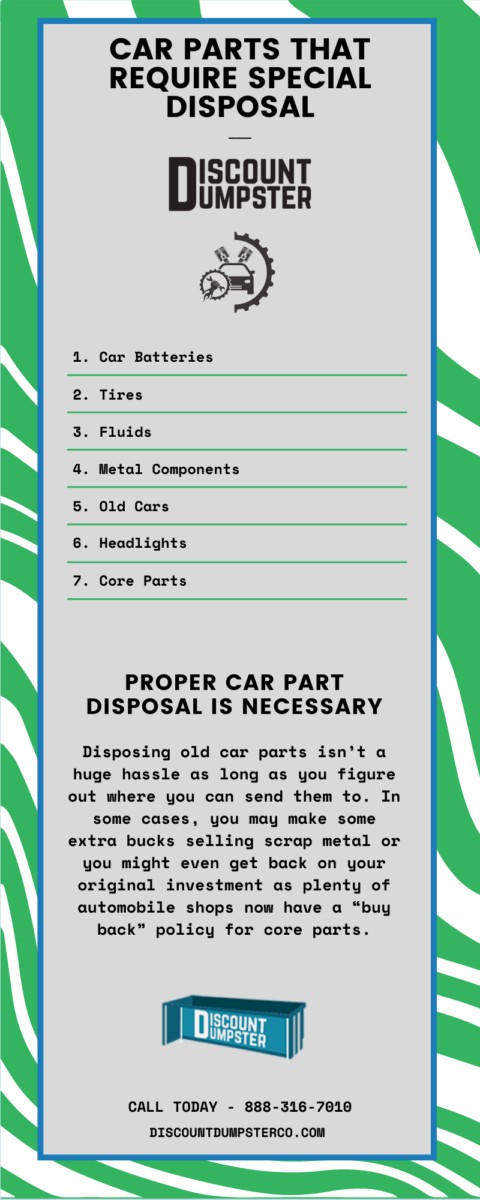Maintaining your vehicle involves regular replacements of various components. From batteries and tires to fluids and metal parts, these old car parts can quickly accumulate. Simply tossing them in the trash isn’t a viable option, especially considering many are hazardous to the environment. Understanding the proper methods for disposing of old car parts is crucial for environmental responsibility and often required by law.
This guide, created by the experts at carparteu.com, will walk you through the best ways to handle your used auto parts, ensuring responsible disposal and potentially even putting some money back in your pocket.
Why Proper Car Part Disposal Matters
As vehicles age, the need for repairs and replacements increases. This can lead to a garage full of old components. Improper disposal of these parts can lead to serious environmental and legal repercussions. Many car parts contain hazardous materials that can contaminate soil and water if not handled correctly. Furthermore, local regulations often prohibit the disposal of certain auto parts in regular household waste.
Fortunately, responsible disposal is easier than you might think. A significant percentage of end-of-life vehicles – around 95% – are already recycled annually, demonstrating the established infrastructure for automotive recycling. Instead of illegal dumping or improper disposal, you have several eco-friendly and compliant options:
- Recycling Centers: Many facilities specialize in recycling automotive materials.
- Auto Parts Stores: Some stores offer take-back programs or core charge refunds.
- Salvage Yards: Accept metal parts and sometimes entire vehicles for scrap.
- Hazardous Waste Disposal Facilities: Essential for toxic fluids and batteries.
- Private Sales or Donation: Viable for usable parts through online marketplaces.
 Used car parts piled up in a garage, highlighting the need for disposal.
Used car parts piled up in a garage, highlighting the need for disposal.
Step-by-Step Guide to Disposing of Your Old Car Parts
If you’re wondering How To Dispose Of Old Car Parts, the first step is identification and segregation. Categorizing your parts will help you determine the best disposal method for each. Here’s a breakdown of common car parts and recommended disposal methods:
1. Car Batteries: Recycling is Key
Car batteries are highly recyclable, despite containing toxic lead. Most auto parts stores and battery retailers accept old batteries for recycling. Often, you’ll receive a core deposit refund when you return your old battery with the purchase of a new one. This system ensures batteries are properly recycled and prevents hazardous materials from entering landfills.
2. Tires: Beyond the Road – Tire Recycling and Repurposing
Old tires can be creatively repurposed at home for projects like swings or planters. However, if you need to dispose of them, tire shops and recycling centers are your best options. Many tire retailers charge a small disposal fee, which covers the cost of recycling. Tire recycling transforms old tires into new products like rubber mulch, asphalt additives, and even new tires.
3. Automotive Fluids: Handle with Care at Hazardous Waste Facilities
Automotive fluids such as motor oil, coolant, transmission fluid, and brake fluid are extremely toxic and require careful disposal. Never pour these fluids down the drain or into the trash. Instead:
- Oil and Oil Filters: Take used oil and filters to designated collection centers, often found at auto parts stores or local recycling facilities. Many service stations also accept used oil.
- Coolant (Antifreeze): Some repair shops may reuse coolant if it’s in good condition. Otherwise, hazardous waste facilities are the proper disposal point for antifreeze and other engine fluids.
- Other Fluids: Transmission fluid and brake fluid should also be taken to auto parts stores or hazardous waste facilities if stores don’t accept them.
Always store fluids in sealed, labeled containers to prevent leaks and spills during transport.
4. Metal Components: Scrap Metal Recycling for Cash
Metal car parts, including doors, radiators, engine blocks, and wheels, are valuable recyclable materials. Salvage yards and scrap metal dealers readily accept these items. You can often earn money by selling your scrap metal, depending on current market prices and the weight of the metal. Clean metal parts (free of fluids and non-metal attachments) are generally preferred and may fetch a better price.
5. Old Cars: End-of-Life Vehicle Recycling Programs
If you have an old car that’s no longer roadworthy, consider selling it to a scrap metal dealer, a junkyard, or donating it to a vehicle recycling program. Many organizations specialize in dismantling and recycling end-of-life vehicles, ensuring that valuable materials are recovered and hazardous components are safely managed. Online searches for “junk car removal” or “car donation” in your area can help you find suitable options.
6. Headlights and Bulbs: Check Local Regulations for Bulbs
Headlights themselves, if just the plastic or glass housing, can often be disposed of with regular trash, but it’s always wise to check local municipal waste disposal guidelines. However, bulbs require more attention:
- Halogen Bulbs: Generally safe for regular trash disposal in most areas, but confirm local regulations.
- LED and HID Bulbs: Some areas may recommend or require recycling for these types of bulbs due to their electronic components. Check local recycling guidelines or with waste management services.
7. Core Parts: Utilize Core Charge Programs at Auto Parts Stores
Core parts like water pumps, alternators, brake calipers, and A/C compressors often have a “core charge” associated with them when you purchase a new part. Returning your old core part to the auto parts store allows you to recoup this charge. These core parts are then remanufactured and resold, reducing waste and conserving resources. Always inquire about core charge returns when buying replacement parts.
Responsible Disposal: Good for You and the Planet
Disposing of old car parts responsibly isn’t just about decluttering your garage; it’s a vital step in environmental stewardship. By understanding how to dispose of old car parts correctly, you contribute to reducing landfill waste, conserving natural resources, and preventing hazardous materials from harming the environment. Furthermore, utilizing recycling programs and core charge returns can even put some money back in your pocket, making responsible disposal both environmentally and economically sound.
For any waste disposal needs beyond car parts, remember that companies like Discount Dumpster are dedicated to providing responsible and efficient waste management solutions.
For further assistance with waste disposal questions, call (888) 316-7010 to connect with waste disposal experts.
